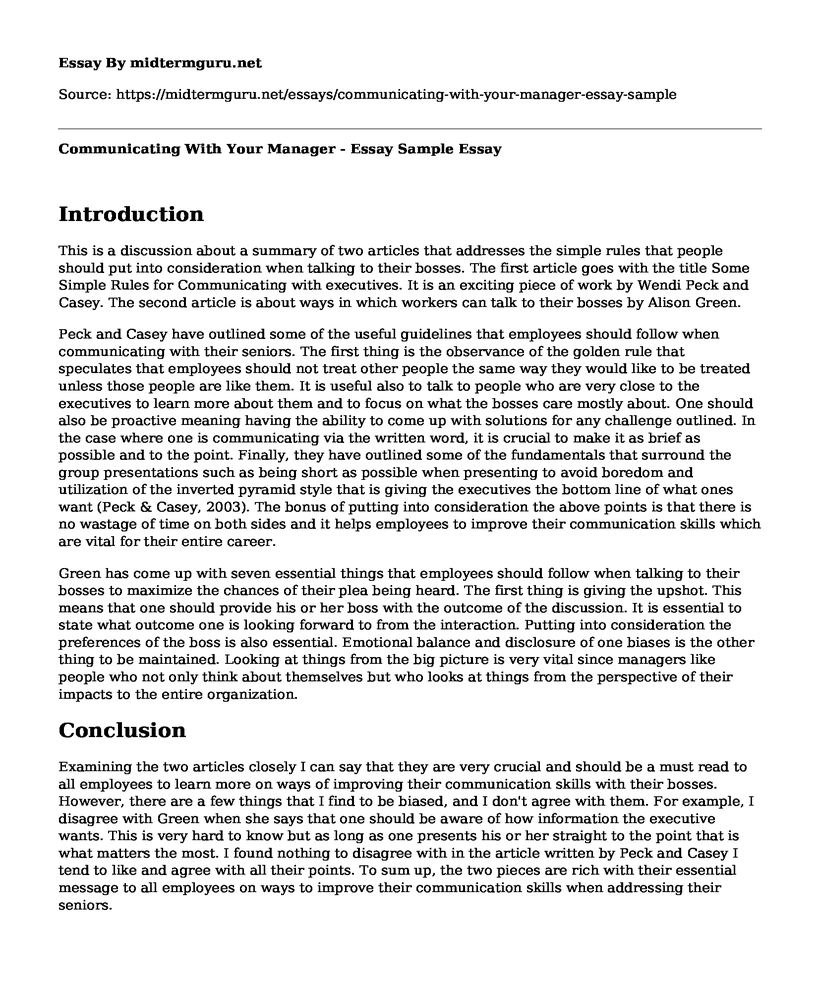Introduction
This is a discussion about a summary of two articles that addresses the simple rules that people should put into consideration when talking to their bosses. The first article goes with the title Some Simple Rules for Communicating with executives. It is an exciting piece of work by Wendi Peck and Casey. The second article is about ways in which workers can talk to their bosses by Alison Green.
Peck and Casey have outlined some of the useful guidelines that employees should follow when communicating with their seniors. The first thing is the observance of the golden rule that speculates that employees should not treat other people the same way they would like to be treated unless those people are like them. It is useful also to talk to people who are very close to the executives to learn more about them and to focus on what the bosses care mostly about. One should also be proactive meaning having the ability to come up with solutions for any challenge outlined. In the case where one is communicating via the written word, it is crucial to make it as brief as possible and to the point. Finally, they have outlined some of the fundamentals that surround the group presentations such as being short as possible when presenting to avoid boredom and utilization of the inverted pyramid style that is giving the executives the bottom line of what ones want (Peck & Casey, 2003). The bonus of putting into consideration the above points is that there is no wastage of time on both sides and it helps employees to improve their communication skills which are vital for their entire career.
Green has come up with seven essential things that employees should follow when talking to their bosses to maximize the chances of their plea being heard. The first thing is giving the upshot. This means that one should provide his or her boss with the outcome of the discussion. It is essential to state what outcome one is looking forward to from the interaction. Putting into consideration the preferences of the boss is also essential. Emotional balance and disclosure of one biases is the other thing to be maintained. Looking at things from the big picture is very vital since managers like people who not only think about themselves but who looks at things from the perspective of their impacts to the entire organization.
Conclusion
Examining the two articles closely I can say that they are very crucial and should be a must read to all employees to learn more on ways of improving their communication skills with their bosses. However, there are a few things that I find to be biased, and I don't agree with them. For example, I disagree with Green when she says that one should be aware of how information the executive wants. This is very hard to know but as long as one presents his or her straight to the point that is what matters the most. I found nothing to disagree with in the article written by Peck and Casey I tend to like and agree with all their points. To sum up, the two pieces are rich with their essential message to all employees on ways to improve their communication skills when addressing their seniors.
References
Peck, W., & Casey, W. (2003, June 26). Some simple rules for communicating with executives. Denver Business Journal. Retrieved fromhttp://www.bizjournals.com/denver/stories/2003/06/30/smallb4.html?page=all
Green, A. (2013, Aug 19). How to Talk so Your Boss Will Listen. U.S News. Retrieved from http://money.usnews.com/money/blogs/outside-voices-careers/2013/08/19/how-to-talk-so-your-boss-will-listen
Cite this page
Communicating With Your Manager - Essay Sample. (2022, Dec 21). Retrieved from https://midtermguru.com/essays/communicating-with-your-manager-essay-sample
If you are the original author of this essay and no longer wish to have it published on the midtermguru.com website, please click below to request its removal:
- Research Paper on Diversity Policy in the Organization
- Financial Statement Analysis of Amazon
- Johnson & Johnson Video Case Analysis Essay
- Financial Analysis of IAG Annual Report - Essay Sample
- Johnson & Johnson Company SWOT and Target Market Analysis - Research Paper
- Delaware: An Ideal State for Corporations to Incorporate - Essay Sample
- Demarco: Balancing Care for Environment, Country & Employer - Essay Sample







